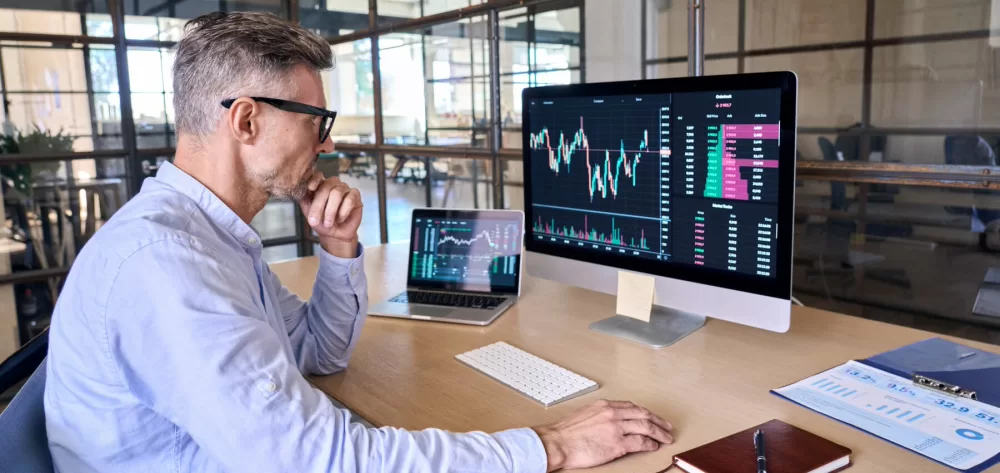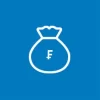In recent years, an increasing number of residents have opted to invest their pillar 3a retirement savings, rather than keeping them in a traditional pillar 3a savings account. Over the long term, using pillar 3a stock investment solutions does make sense, because the expected performance is much better than that of Swiss savings accounts. But the trend towards investment solutions is also fueled by banks, which earn money from the fees of retirement funds.
Expensive retirement funds
moneyland.ch calculated the total costs of 85 Swiss retirement funds. In addition to the costs of the funds themselves, which are measured by the total expense ratio (TER), the total costs also include other relevant costs like sales charges, custody fees for the holding of fund shares, flat fees, and deferred sales charges.
The results show that on average, the analyzed retirement funds had total costs of 1.07 percent per year. There are major differences between the individual funds. You can download the detailed comparison here (German PDF).
Compared to last year, the average total costs have come down slightly. A few service providers have lowered or completely eliminated their sales charges and deferred sales charges. These are one-time fees that you pay when you buy and when you sell shares in a fund respectively.
“On the whole, little has changed in the retirement fund market, in spite of the arrival of more successful and cheaper retirement asset management apps,” says moneyland.ch CEO Benjamin Manz. The reduction in average total costs compared to last year (1.09 percent) is marginal. “But moneyland.ch believes that the situation will change in the future, as more and more customers begin adopting retirement asset management apps.”
Major cost differences
With average total costs of 1.07 percent per year, retirement funds are still expensive, on the whole. But the differences between individual funds are substantial.
With an investment of 100,000 francs over 10 years, the total costs for the most expensive stock retirement fund in the comparison was 1690 francs per year. That translates into an annual expense of nearly 1.7 percent.
By contrast, the cheapest Swiss pillar 3a stock retirement fund from the Basellandschaftlichen Kantonalbank has total costs of just 350 francs per year, or 0.35 percent, for the same size of investment. So the most expensive Swiss retirement fund is more than four times as expensive as the cheapest.
«With the differences in costs being so large, comparing total costs is imperative,” stresses moneyland.ch analyst Felix Oeschger.
Actively-managed funds are nearly twice as expensive as passively-managed funds
The advantages of passively-managed funds like ETFs, are well-known. Passively-managed funds are typically cheaper, while actively-managed funds rarely managed to outperform market indexes over long terms.
This pattern is visible over the 85 analyzed pillar 3a retirement funds. The annual costs of passively-managed retirement funds average 0.65 percent per year, while those of actively-managed funds are nearly twice as high, at 1.15 percent per year. Passively-managed funds also delivered better average performance, but a direct comparison is difficult because of differences in asset allocation between actively-managed and passively-managed funds.
Actively-managed funds continue to be widely used in the pillar 3a, says Felix Oeschger from moneyland.ch. But the advantages of passively-managed retirement funds are particularly relevant for people investing over long terms with the pillar 3a.
Investment apps are cheaper than conventional funds
Apart from actual retirement funds, which are the focus of this study, there are also online retirement asset management services for the pillar 3a. For these retirement saving apps, moneyland.ch analyzes the costs separately. The verdict: Online retirement asset management services are clearly cheaper than retirement funds. The cheapest retirement saving apps, such as True Wealth, have total costs of just 0.15 percent per year. That makes True Wealth seven times cheaper than the average retirement fund.
Past performance compared
As well as calculating the total costs, moneyland.ch also calculated the performance of Swiss retirement funds. Performance was calculated up until the end of October 2023, for periods of one year (end of October 2022 until the end of October 2023), three years, five years, and ten years. Performance calculations account for TER costs and possible dividends.
On average, Swiss retirement funds gained in value by 0.4 percent over the past year (end of October 2022 until the end of October 2023). The performance of individual funds ranged between -3.4 percent and 5.7 percent.
By comparison, the Swiss Performance Index (SPI) fell by 1.4 percent over that same period. The Swiss Bond Index (SBI), developed better, climbing by 3.0 percent. Because stocks and bonds make up around 90 percent of the investments of Swiss retirement funds, a comparison with these indexes makes sense. However, it is important to note that many funds also invest in foreign securities – primarily US securities.
The performance over the past three years (end of October 2020 until the end of October 2023) ranged between -13.6 percent and 24.3 percent, depending on the fund. The average is 1.5 percent. By comparison, the SPI gained by 13.5 percent over the same period, while the SBI fell by 9.7 percent.
Average performance over the past five years was 7.0 percent, with individual fund performance ranging between -9.6 percent and 36.6 percent. The average performance over the past ten years, accounting for retirement funds that have been in existence for the past 10 years or more, was 18.7 percent (individual fund performance ranged between -8.7 percent and 54.2 percent).
However, you should not place too strong an emphasis on historical performance when choosing the right retirement fund. Just because a fund has performed well in the past, that does not mean that it will continue performing well in the future. It is more important to choose the lowest-cost retirement fund that matches your investment profile.
Stocks deliver higher returns than bonds
Over the mid-term to long-term, stocks have historically delivered higher returns than bonds. That pattern is also visible when you look at retirement funds.
For example, over the past three years, funds with a large stock component had an average performance of 12.2 percent, while funds with a large bond component had an average performance of 5.6 percent.
The difference is much bigger over the past five years. The average performance of funds with large stock components was 22.0 percent, while that of funds with large bond components was 0.6 percent.
“If you want to invest over a long term, then retirement funds with big stock components are the better choice,” says Felix Oeschger.
More on this topic:
Download the detailed tables for the Swiss Retirement Fund Study 2023 (German PDF)
Compare Swiss retirement funds now
Compare Swiss pillar 3a savings accounts now
Swiss online retirement asset management apps compared
Methodology
moneyland.ch analyzed the costs, conditions, and returns of 85 Swiss retirement funds. Unlike retirement asset management services, a retirement fund always has its own ISIN.
Calculations of total costs are modeled based on a constant value of 100,000 francs of invested capital across the entire term, and on the assumption that investors will buy fund shares and then sell them after 10 years. The total costs account for TER fees as well as sales charges, custody fees, flat fees, and deferred sales charges.
The performance figures already account for TER costs. In the case of distributing funds, the performance is calculated based on the assumption that dividends are reinvested into the fund (total return). The shares of the BLKB iQ Fund - Responsible Equity World ex Switzerland B USD retirement fund are denominated in USD, but performance figures are published in CHF (currency-adjusted).
Cost and performance figures as per data published by fund operators (Date: November 2023).
TER figures are the current TERs as per fund operators. The TER figures include ongoing fund expenses. Costs that are not included in the TER but are accounted for in the total cost are sales charges, custody fees, flat fees, and deferred sales charges. If a TER KGAST or a synthetic TER is available, this figure is used. A fund’s TER is calculated in arrears.





